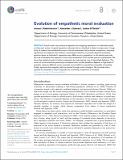Files in this item
Evolution of empathetic moral evaluation
Item metadata
| dc.contributor.author | Radzvilavicius, Arunas L | |
| dc.contributor.author | Stewart, Alexander J | |
| dc.contributor.author | Plotkin, Joshua B | |
| dc.date.accessioned | 2021-03-02T11:30:39Z | |
| dc.date.available | 2021-03-02T11:30:39Z | |
| dc.date.issued | 2019-04-09 | |
| dc.identifier | 272143073 | |
| dc.identifier | aeae1e66-95d7-4c5f-abde-389d3e1af764 | |
| dc.identifier | 30964002 | |
| dc.identifier | 85065344033 | |
| dc.identifier.citation | Radzvilavicius , A L , Stewart , A J & Plotkin , J B 2019 , ' Evolution of empathetic moral evaluation ' , eLife , vol. 8 , e44269 . https://doi.org/10.7554/eLife.44269 | en |
| dc.identifier.issn | 2050-084X | |
| dc.identifier.other | PubMedCentral: PMC6488294 | |
| dc.identifier.other | ORCID: /0000-0001-5234-3871/work/86538492 | |
| dc.identifier.uri | https://hdl.handle.net/10023/21535 | |
| dc.description | Funding: David and Lucile Packard Foundation, Army Research Office (W911NF-12-R-0012-04). | en |
| dc.description.abstract | Social norms can promote cooperation by assigning reputations to individuals based on their past actions. A good reputation indicates that an individual is likely to reciprocate. A large body of research has established norms of moral assessment that promote cooperation, assuming reputations are objective. But without a centralized institution to provide objective evaluation, opinions about an individual's reputation may differ across a population. In this setting we study the role of empathy-the capacity to form moral evaluations from another person's perspective. We show that empathy tends to foster cooperation by reducing the rate of unjustified defection. The norms of moral evaluation previously considered most socially beneficial depend on high levels of empathy, whereas different norms maximize social welfare in populations incapable of empathy. Finally, we show that empathy itself can evolve through social contagion. We conclude that a capacity for empathy is a key component for sustaining cooperation in societies. | |
| dc.format.extent | 17 | |
| dc.format.extent | 2750305 | |
| dc.language.iso | eng | |
| dc.relation.ispartof | eLife | en |
| dc.subject | Cooperative Behavior | en |
| dc.subject | Empathy | en |
| dc.subject | Humans | en |
| dc.subject | Models, Psychological | en |
| dc.subject | Morals | en |
| dc.subject | Social Norms | en |
| dc.subject | GN Anthropology | en |
| dc.subject | QH301 Biology | en |
| dc.subject | T-NDAS | en |
| dc.subject.lcc | GN | en |
| dc.subject.lcc | QH301 | en |
| dc.title | Evolution of empathetic moral evaluation | en |
| dc.type | Journal article | en |
| dc.contributor.institution | University of St Andrews. Applied Mathematics | en |
| dc.identifier.doi | https://doi.org/10.7554/eLife.44269 | |
| dc.description.status | Peer reviewed | en |
This item appears in the following Collection(s)
Items in the St Andrews Research Repository are protected by copyright, with all rights reserved, unless otherwise indicated.

